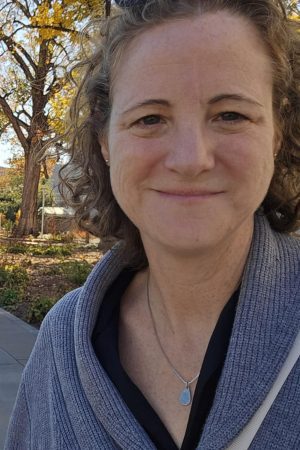Emily Gunzburger Makaš

Emily Gunzburger Makaš
Emily Makaš has a Ph.D. in the History of Architecture and Urbanism from Cornell University (2007), a Masters in Historic Preservation from Columbia University (1997), and a Bachelor’s in History from the University of Tennessee (1995).
Makaš is a founding leader of the Center for Community, Heritage, and the Arts (CHArt), a pilot research center in the College of Arts + Architecture supported by the UNC Charlotte Division of Research. CHArt works to empower communities to reclaim, elevate, and co-create cultural histories. It foregrounds interdisciplinary conversations that strengthen existing collaborations and build new research initiatives exploring the connection between community, place-making, culture, heritage, and the arts.
Research
Makaš’s research focuses on connections between memory and identity and the built environment. She is interested in architecture, urbanism, heritage, commemoration, and politics. Here recent work focused on Southeastern Europe explores relationships between public history and urban and national identities in Sarajevo and Mostar from the late 19th century to the present. Current projects include:
- a monograph on commemoration, heritage reconstruction, and public space in Bosnia-Hercegovina titled Urban and National Identities and the Rebuilding of Mostar (forthcoming from Routledge)
- a book chapter on the pavilion of Bosnia-Hercegovina at the 1900 World’s Exposition in Paris
- a book chapter on the role of Islamic Heritage in the formation of identities and images of Bosnian cities (forthcoming from IRCICA)
- encyclopedia entry on heritage and conflict in Mostar (forthcoming from Palgrave)
- an edited volume Planning Eastern European Capital Cities, 1945-1989 (forthcoming from Routledge)
She has also turned closer to home and leads teams of faculty and students on public history and heritage project exploring identity in Charlotte and the wider Southeastern United States. She is working on a co-edited book proposal exploring the life and work of the architect Phil Freelon with architectural historian Arthur J. Clement. In addition, recent exhibitions she has curated include:
- “The Freelon Group: Designs for Historically Black Colleges and Universities,” Florida A&M University, Tallahassee, FL, Spring 2023-20024
- “Container/Contained: Phil Freelon: Design Strategies for Telling African American Stories,” Harvey B. Gantt Center for African-American Art and Culture, Charlotte, NC, Fall 2021 + North Carolina Museum of Art, Raleigh, NC, Spring 2022
- “Legacy of Lynching”, Levine Museum of the New South, Charlotte, NC
- “Charlotte Strong: Tragedy and Response,” Art Gallery, Popp Martin Student Union, University of North Carolina at Charlotte, Charlotte, NC
- “The Legacy of Lynching: Confronting Racial Terror in America” / “It Happened Here,” Levine Museum of the New South, Charlotte, NC, 2019-2022
Teaching
Makaš’s teaching relates to her research interests and includes upper-level history seminars on topics on Museums, Adaptive Reuse, Capital Cities, and Architecture and Identity. She has also taught Historiographic Methods, Graduate Research and Design Methods, and Reading, Writing, Thinking Architecture. She advises students in the Minor in Architectural History and Criticism and proposed MS in Architecture Critical Heritage Studies concentration. Makaš has co-led study abroad programs to Berlin (Spring 2010, Summer 2018) and Central European Capital Cities (Summer 2012).
Key publications
- “Heritage Reconstruction in Mostar: Memories and Identities in Post-Conflict Bosnia-Hercegovina,” In Transforming National Heritages in the former Yugoslavia: Synchronous Pasts, ed. by G. Badescu, B. Baille, F. Mazzucchelli, an. London: Palgrave MacMillan.
- “Rebuilding Mostar: International and Local Visions of a Contested City and its Heritage.” In On Location: Heritage Cities and Sites, edited by D.F. Ruggles. New York: Springer, 2021.
- Architectural Conservation in Europe and the Americas (Wiley, 2011, co-authored with J.H. Stubbs)
- “Shaping Central and Southeastern European Capital Cities in the Age of Nationalism,” with T.D. Conley. In Capital Cites in the Aftermath of Empires, edited by E.G. Makaš and T.D. Conley. London: Routledge, 2010.
- “Sarajevo.” In Capital Cites in the Aftermath of Empires, by E.G. Makaš and T.D. Conley. London: Routledge, 2010
- Capital Cities in the Aftermath of Empires: Planning in Central and Southeastern Europe (Routledge, 2010, co-edited with T.D. Conley)
- “Interpreting Multivalent Sites: New Meanings of Mostar’s Old Bridge,” Centropa 5:1 (January 2005) special issue “Methodology and Theory in Central European Art and Architecture,” guest edited by Christopher Long
EXPLORE HER RECENT WORK
Container / Contained: Phil Freelon: This series of exhibitions critically examines Freelon’s work, including museums, libraries, cultural centers, public parks, and educational buildings. The focus on projects that foreground African American communities and identities and tell African American stories through architecture.
Read more about the Gantt Center exhibition →
Read more about the NCMA exhibition →
Read more of Maas on Freelon →
Watch a making of video →
Urban and National Identities in a Post-Conflict Mostar: In this publication in progress, Makas argues that on the ‘architectural front’ conflict continued long after the war ended: the struggle between Bosnia’s possible multicultural identity and its three particular nationalisms – Serb, Croat, and Muslim – has been consciously and unconsciously articulated through the rebuilding of destroyed heritage and the construction of new buildings and memorials.
Read more →
Community Remembrance Project: Makas is on the local steering committee working with the Montgomery-based Equal Justice Initative to foster public conversations and increase the memory of lynching in Mecklenburg County. With her students, she co-curated an exibition at the Levine Museum and with community partners she is working to install markers in Charlotte to recognize the victims.
Read more about the Levine Museum Exhibition →
Watch a making of video →
Read more about EJI’s Community Remembrance Project →